When you walk into a store, have you ever thought about how some products are placed differently that catches your attention? AI in retail example is the placement of dairy products right near the billing counter and chewing gums & chocolates are placed at the billing point – this is called inventory placement, and it is done with the help of an AI. AI is transitioning the way stores operate, from predicting what products will be hot each season to managing inventories to align perfectly with consumer demands. By analyzing vast amounts of data—from past purchases to trending social media topics—AI ensures that retailers are not just meeting but anticipating customer needs, leading to a smoother and more personalized shopping experience.
But AI’s role doesn’t stop at the store shelf. It extends deep into the supply chain, making it smarter and more efficient. The AI sector within the retail industry is projected to expand from USD 13.07 billion in 2025 to USD 53.74 billion by 2030, achieving a compound annual growth rate (CAGR) of 32.68% over the five-year forecast period from 2025 to 2030.
For modern retailers, integrating AI into their supply chain operations is crucial. It means they can optimize everything from how much stock to buy, to how it’s distributed across stores and warehouses, and even how it’s delivered to your doorstep. This leads to reduced costs, faster deliveries, and fewer errors—benefits that help keep prices competitive while enhancing customer satisfaction. Retailers like Target and Walmart are already seeing the benefits, using AI to keep popular items in stock and deliver an efficient shopping experience that keeps customers coming back.
Understanding AI in Retail Supply Chains
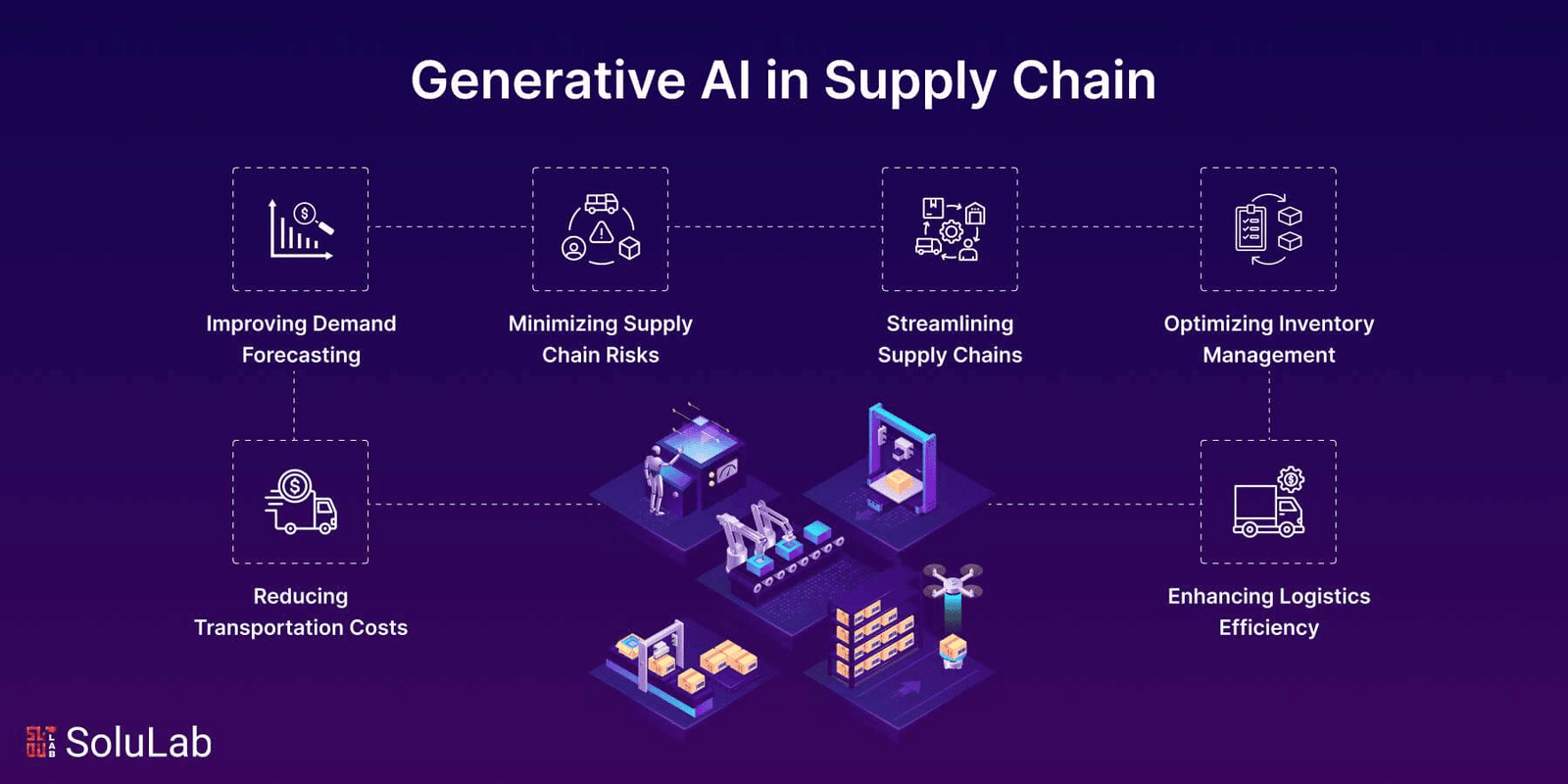
Source: https://www.solulab.com/generative-ai-in-supply-chain/
AI refers to systems or machines that mimic human intelligence to perform tasks and can iteratively improve themselves based on the information they collect. In retail, AI transforms mountains of data—like sales figures, customer feedback, and inventory levels—into actionable insights. This enables stores to be more efficient and responsive to your needs.
Common AI Technologies in Retail Supply Chains
- Machine Learning: This is the real powerhouse behind AI in retail. Machine learning algorithms use historical data to predict future trends. One of the prime examples of AI in retail, is that it can forecast product demand during different seasons, ensuring that retailers order just the right amount of stock. Also, according to CHI Software, the machine learning segment generated over 31% of revenue in 2023 in the retail industry.
- Predictive Analytics: This technology helps retailers understand what customers might buy in the future based on past buying behavior. It’s like having a crystal ball, but one powered by data science, which helps in planning everything from marketing campaigns to stock levels.
- Natural Language Processing (NLP): Ever chat with a customer service bot on a retail website? That’s NLP in action. It processes and understands human language, allowing retailers to automate customer service chats and even analyze customer reviews or feedback on social media.
Key Uses in Retail
- Inventory Management: AI provides retailers with smarter ways to manage inventory, reducing overstock and understock situations.
- Customer Experience Enhancement: By analyzing shopping patterns, AI helps create a personalized shopping experience for each customer.
- Efficient Logistics and Distribution: AI optimizes routes for delivery vehicles, reducing delivery times and costs.
Enhancing Forecasting and Inventory Management
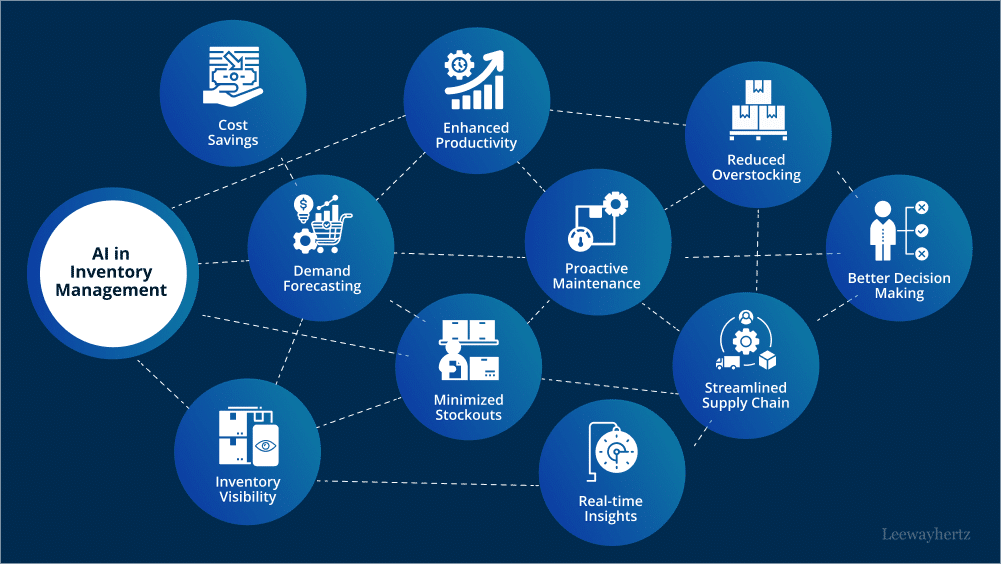
Here’s how AI enhances forecasting and inventory management in the retail world, ensuring shelves are stocked just right every time.
AI’s Role in Demand Forecasting
- Predictive Powers: AI uses historical sales data, trends, seasonal peaks, and even factors like weather forecasts to predict future product demand. This isn’t just guessing; it’s a calculated analysis that allows stores to anticipate what shoppers will buy in the coming weeks or months.
- Efficiency and Accuracy: With AI, forecasting is not only faster but also more accurate. This reduces the chances of human error and allows for smarter decision-making. Retailers can now respond more swiftly to changing consumer demands without the lag of manual processing.
Case Study: Major Retail Chains
- Optimizing Inventory: Many big-name retail chains are harnessing AI to refine their inventory practices. They align their inventory levels precisely with consumer demand predictions by employing predictive analytics.
A leading supermarket chain uses AI in the retail market to monitor shopping trends and automatically adjusts order quantities. This system considers everything from the rate at which items are selling to upcoming holidays that might affect shopping patterns.
Key Benefits in Inventory Management
- Reduced Overstock and Understock: AI’s accurate demand forecasts mean retailers can avoid overstocking, which ties up capital, and understocking, which leads to missed sales.
- Smart Replenishment: AI not only tells retailers how much of an item to keep in stock but also when to reorder. Automated replenishment systems can initiate orders at the optimal time to ensure new stock arrives exactly when needed, keeping supply chains lean and mean.
- Increased Sales and Customer Satisfaction: Stores that maintain optimal stock levels are more likely to have satisfied customers who can always find what they need. This directly translates to better sales figures and fewer lost opportunities due to out-of-stock situations.
- Cost Efficiency: By precisely managing inventory, retailers can significantly cut costs associated with excess inventory and rushed orders.
AI in Streamlining Logistics and Distribution
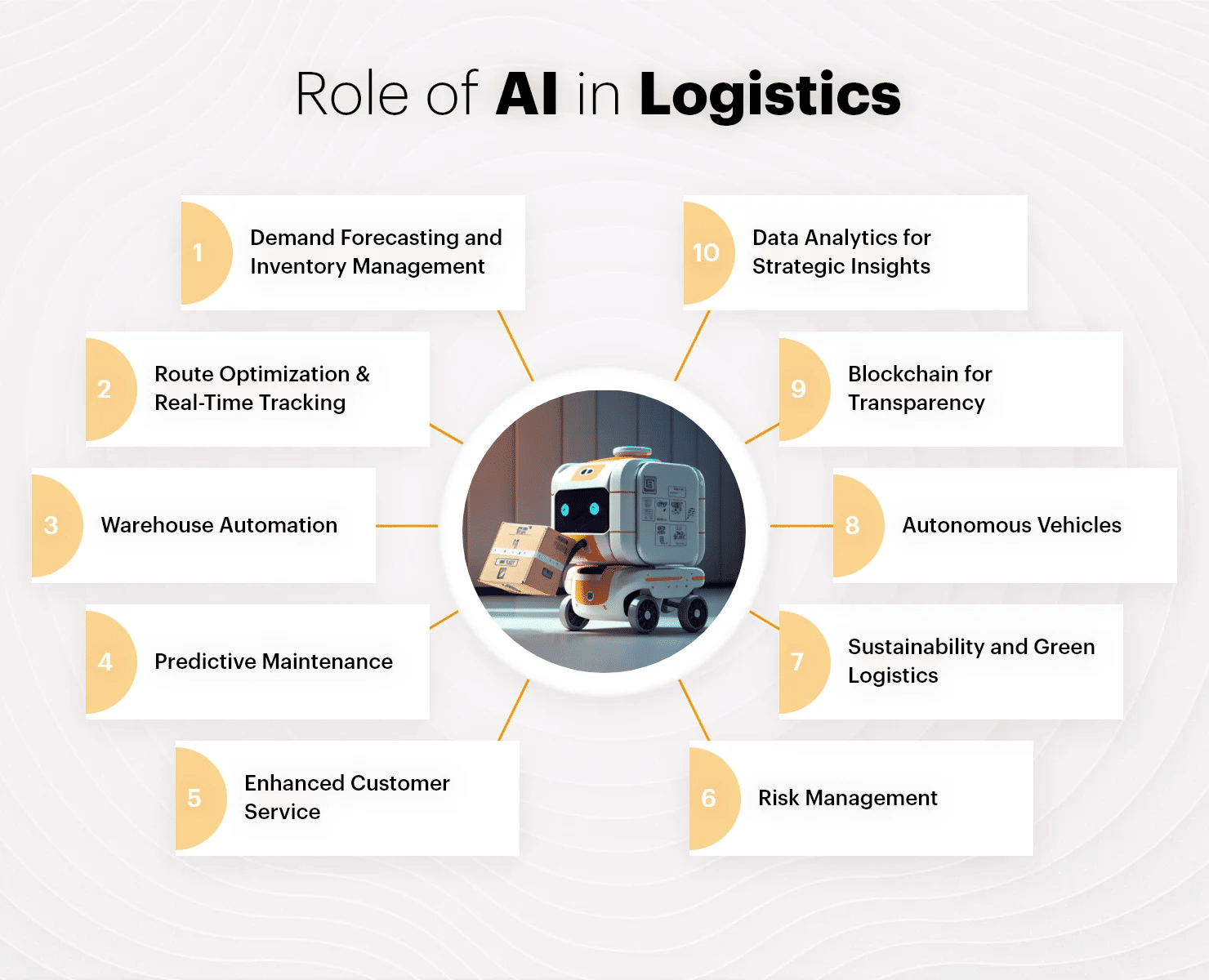
Source: https://codiant.com/blog/how-ai-is-effective-in-logistic-industry/
Ever ordered something online and it arrived faster than you expected? It’s AI working behind the scenes. AI making it smarter, faster, and more cost-effective. According to one study, 60% of retail companies are planning to increase their investments in AI soon. Additionally, by 2025, 80% of retail executives anticipate that their organizations will have adopted AI automation.
Let’s dive into how AI is streamlining these crucial areas in retail.
AI Applications in Logistics
- Warehouse Automation: AI isn’t just about software development. In many modern warehouses, robots and autonomous vehicles are becoming common. These AI-driven machines can pick and pack orders, manage inventory, and even handle tasks that are too dangerous for humans. This automation speeds up operations and reduces the likelihood of errors, ensuring products are shipped efficiently and correctly.
- Route Optimization: AI takes things further by optimizing delivery routes. This isn’t just about finding the shortest path, but also about analyzing traffic patterns, weather conditions, and delivery windows to ensure drivers take the best possible routes. This means your orders not only arrive faster but also in a more eco-friendly way as less fuel is used.
Impact of AI on Logistics
- Reduced Shipping Costs: By optimizing delivery routes and automating warehouse operations, AI significantly cuts down on logistics costs. This saving can often be passed on to customers, making prices more competitive. McKinsey predicts that by enhancing digital customer interactions, artificial intelligence could generate an additional $310 billion for the retail sector.
- Improved Delivery Times: With route optimization and efficient warehouse operations, AI drastically reduces delays in the supply chain. This means customers get their orders quicker than ever before.
- AI-Driven Routing Algorithms: Consider how major e-commerce giants use AI to adjust delivery routes in real-time. These systems take into account ongoing traffic updates, weather changes, and even last-minute order modifications to ensure that all packages are delivered using the most efficient routes possible. The result? Faster deliveries and happier customers.
AI in Enhancing Supplier Relationship Management
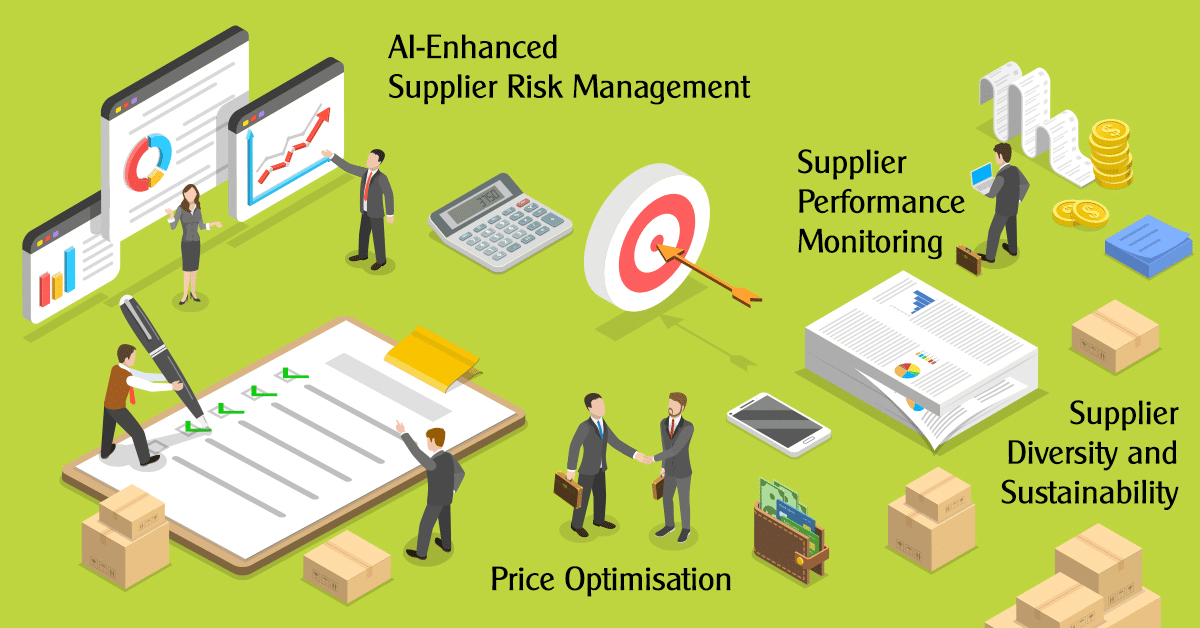
Source: https://www.comprara.com.au/enhancing-supplier-relationship-management-with-an-ai-co-pilot/
Behind the smooth process, there’s a complex network of supplier relationships that need to be managed effectively. This is where AI steps in, changing how retailers interact with their suppliers to ensure everything runs like clockwork. In January 2024, Google Cloud introduced several cutting-edge AI technologies designed to help retailers modernize their operations, personalize online shopping experiences, and revolutionize the deployment of in-store technology.
Enhancing Supplier Selection
- Risk and Compliance Analysis: AI platforms leverage data analysis to vet potential suppliers more effectively. They assess risk factors and compliance by examining past performance, financial stability, and adherence to regulations. This predictive insight helps retailers make informed decisions about whom to work with, reducing potential supply chain disruptions.
- Predictive Analytics: By predicting which suppliers are likely to meet demand under various conditions, AI helps retailers plan better and avoid stock shortages.
- Automated Communication Tools: AI enhances communication between retailers and suppliers by automating routine interactions and notifications. For instance, AI systems can automatically alert suppliers about inventory levels, upcoming promotions, and changes in demand.
- Real-Time Data Sharing: Platforms equipped with AI can facilitate instantaneous sharing of data between retailers and suppliers. This means that both parties always have access to up-to-date information, from sales forecasts to stock levels, enabling quicker reactions to market changes.
Performance Monitoring
- Continuous Assessment: AI tools continuously analyze the performance of suppliers by tracking delivery times, quality of goods, and adherence to service level agreements. This ongoing assessment helps retailers identify areas for improvement and commend high-performing suppliers, fostering a competitive environment that boosts overall quality.
- Dynamic Feedback Mechanisms: Instead of annual reviews, AI systems provide real-time feedback to suppliers based on performance metrics. This helps suppliers adjust their operations to meet retailers’ needs more effectively.
Some leading retailers use AI platforms that integrate various data sources to monitor supplier health indicators, such as credit scores, market conditions, and geopolitical risks. This holistic view ensures that retailers can anticipate and mitigate risks before they impact the supply chain.
Customer Experience Through AI-Enhanced Supply Chains
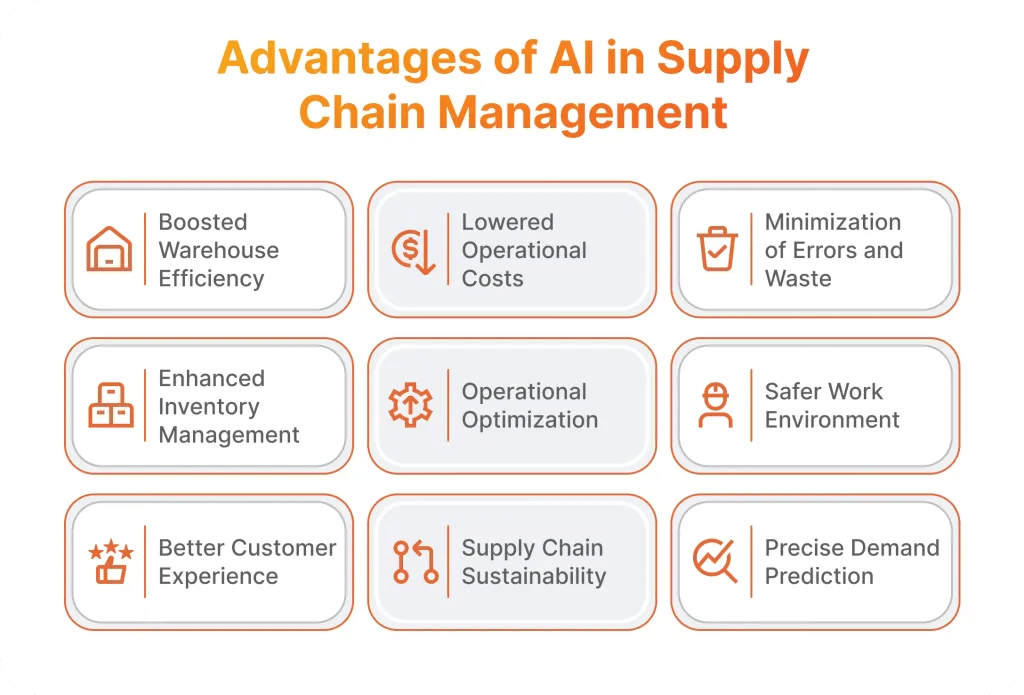
AI is quietly transforming how goods move from warehouses to your hands, ensuring that every step of the process is seamless, efficient, and tailored to meet customer expectations. In the United States, 33% of B2B eCommerce companies have fully integrated AI into their operations, while 47% are currently assessing the technology according to sellerscommerce.
- Perfect Timing: AI supply chain companies excel in timing. They predict when products will be needed and ensure they are stocked and ready to ship. This reduces the dreaded “out of stock” status that can drive customers away.
- Faster Deliveries: By optimizing delivery routes and warehouse operations, AI gets your order to you faster than ever. This isn’t just convenient; it’s often the deciding factor in where customers choose to shop.
- Keeping Customers in the Loop: AI systems are fantastic communicators. For instance, when you order something online, AI can provide real-time updates on where your item is and when it will arrive at your door. This transparency builds trust and increases customer satisfaction.
- Anticipatory Shipping: Some retailers use AI to predict what you’ll buy and even start the shipping process before you click ‘buy’. This can lead to delightfully quick delivery times, sometimes as fast as the same day.
A popular online retailer uses AI to not only track your package but to adjust delivery estimates based on real-time factors like weather or traffic. Customers receive updates via text or email, ensuring they’re always in the know and can plan their day around the arrival of their package.
Overcoming Challenges and Barriers to Adoption
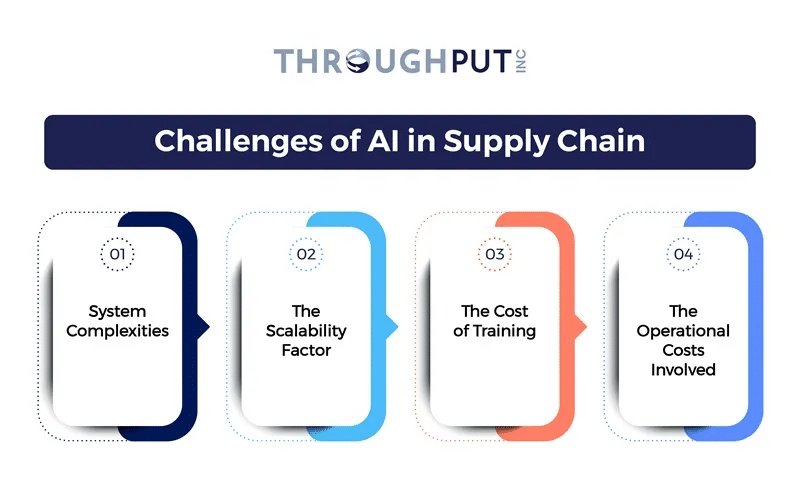
Source: https://throughput.world/blog/ai-in-supply-chain-and-logistics/
Integrating retail AI solutions sounds like a surefire way to streamline operations and enhance customer satisfaction, right? Retailers face real challenges when it comes to adopting AI, from the hefty price tag to the complexity of new technologies and even good old resistance to change.
- Cost Concerns: Implementing AI can be expensive. Between the initial investment in technology and ongoing maintenance costs, the price tag can be daunting for many retailers, especially small to medium-sized enterprises.
- Complex Technology: AI isn’t just a plug-and-play solution. It involves complex systems that can be challenging to integrate and manage without the right skills.
- Resistance to Change: Change is hard. Introducing AI often means shaking up well-established workflows, which can meet with resistance from staff at all levels.
Overcoming the Challenges
- Phased Implementation: Jumping in all at once might feel overwhelming. A phased approach allows retailers to introduce AI gradually. Start with one area of the supply chain management AI—perhaps inventory management—and expand as comfort and familiarity grow.
- Invest in Training: One of the best ways to overcome resistance to change is through education. Providing comprehensive training ensures that employees not only understand how AI systems work but also how they make their jobs easier and more impactful.
- Choosing the Right Partners: Not all AI solutions are created equal, nor are all technology providers. Partnering with the right tech retail AI companies is crucial. Look for partners who offer robust after-sales support and who are willing to walk you through the integration process step by step.
Top Companies using AI in Retail
1. Amazon

There’s no talking about AI solutions for retail without mentioning Amazon. They use AI in almost every part of their massive operation. From the algorithms that suggest what you should buy next, to the sophisticated logistics that ensure your package arrives swiftly, AI for supply chain management is the backbone of Amazon’s customer service. Their AI prowess also extends to Amazon Go stores, where customers can shop without any checkout process—just grab your items and go!
2. Walmart

Source: https://emerj.com/ai-at-walmart/
Walmart is turning to AI to keep their prices low and shelves stocked. They use machine learning to predict what products will be in demand and where. This helps them manage inventory more efficiently and minimize waste. Additionally, Walmart uses AI to optimize delivery routes, ensuring that online orders land on your doorstep faster and fresher than ever.
3. Alibaba

Source: https://www.alizila.com/at-alibaba-artificial-intelligence-is-changing-how-people-shop-online/
Alibaba, the Chinese e-commerce giant, has embraced AI to create a more personalized shopping experience and streamline their massive logistical operations. Their AI-driven system analyzes shopper behavior to tailor product recommendations and offers. In the backend, supply chain AI software enhances the efficiency of deliveries across the vast landscapes of China.
4. Target

Source: https://progressivegrocer.com/how-target-uses-ai-deliver-superior-customer-associate-experience
Target uses AI to make shopping smoother and more enjoyable. Their AI tools analyze shopping trends to ensure that popular items are always in stock, especially during peak shopping seasons. They’ve also implemented AI to help with pricing and promotions, ensuring that deals are timely and relevant to you, the shopper.
5. Nordstrom

Source: https://www.marketingdive.com/news/nordstrom-generative-ai-holiday-app-refresh/732811/
Nordstrom is using AI to bring a touch of luxury to online shopping. Their AI-enhanced tool offers personalized clothing recommendations based on your style and shopping history. They also use AI to manage their inventory, ensuring that popular items are well-stocked and that stores and online platforms are in sync with what customers want.
Conclusion
As more retailers turn to AI to streamline their operations, the impact on supply chain management has been significant. By integrating AI, ecommerce companies are able to predict demand more accurately, manage inventory more efficiently, and deliver a smoother customer experience. These benefits aren’t just theoretical; real-world AI in supply chain examples show how AI has transitioned stock management and reduced waste, ensuring products are available when and where they’re needed. Companies using AI in retail are setting new standards in efficiency and customer satisfaction, with AI use cases in retail becoming benchmarks for the industry.
But what’s next for AI in retail supply chains? The future holds even greater possibilities as technology evolves. Experts suggest that the next wave of AI advancements will bring even deeper insights into consumer behavior and more nuanced control over the use of AI in supply chain management. This isn’t just about improving what we already have; it’s about revolutionizing how retail works from the ground up. The question remains, however, are retailers ready to meet the challenges of this AI-driven future? The answer to that could shape the retail landscape for years to come.
SHARE THIS POST












